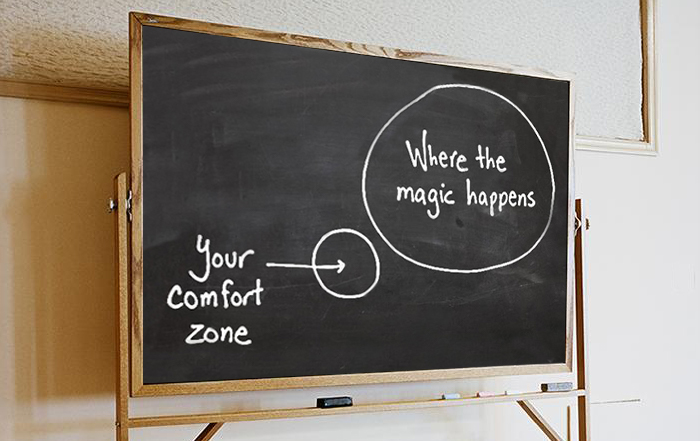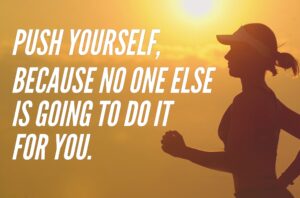
Getting out of your comfort zone and move to where the magic happens.
– An 8’ read that could change your life –
Many people, businessmen or sportsmen, talk about getting into the “power zone”. This might sound esoteric but it is just an area where you feel you are thriving and fitting naturally, getting a close understanding of your area of expertise.
For example, learning French can be hard and require lots of time and energy but the day you spend 6 months in France, live the culture, breath French every day, you will start dreaming in French and won’t struggle to find your words. You are getting into your comfort zone in that field.
It is the same principle in business, sales stars know how to get customers on board, and it looks natural with barely any effort while most struggle to find new prospects.
So, How do you get to your power zone?
You need to be physically and mentally ready for it.
A- Physically fit
It starts with some kind of commitment. How do you get fit when you are not an athlete (to the point you might become one)?
As Jim John (the famous American entrepreneur and motivational speaker) said: “Take care of your body. It’s the only place you have to live in.”
A1- Eat healthily. This might sound obvious but simple changes make a big difference.
- Stop any fizzy or sugary drinks or sugary food today. It will stop the permanent craving that makes you dependent on it. If you really need to eat something, eat a banana or a carrot.
- Reduce processed food or Uber eats and cook simple organic food. It is not only healthier but also a good learning process, more on this in part B.
- You don’t need to eat that much, don’t double serve, just 1 portion is enough. Start fasting once a week for a period of 14 hours. More can be read on this matter, fasting has many positive benefits for your body.
- Stop daily smoking/drinking or any daily unhealthy dependence. Smoking/drinking, if you can’t stop should only be a social thing, a reward for the good stuff you are doing during the week, not a daily bad habit. You might reach a point where it won’t make sense anymore when you start exercising.
A2- Start exercising now if you don’t already
- It can start by walking to the next bus stop or walking the dog and slightly increasing intensity, from moving to the next bus to a few bus stops to walking the dog around the block to around the park.
- Start running. This might sound super boring but gets you to release daily stress, and lose extra weight quite quickly and has many benefits. Again increase the intensity from 1km on the first day at a slow pace to 3km on the Fifth day at a faster pace then rest for 1 or 2 days depending on how you feel. If you can’t run (because of past injuries), swim or bike.
- Register for a race. Giving you an objective, registering for a race 6 months ahead will give you the motivation to keep training every day, every week. In my case, after a year, I have lost 6kg doing so (even though I did not need to lose much weight) and now run 70km per week and train for Ultra Trails.
This gets me into the second part:
B- Mentally fit
If you feel physically fit, you will more likely feel stronger mentally. Your mind gets better organised as you have to create habits/routines for your physical training. Mental training is similar. As Jim Rohn added: “Formal education will make you a living; self-education will make you a fortune.”
B1- Create a routine you stick to. Routines make your brain work less hard so that it can focus on the harder stuff.
B2- Your mind is usually more focused in the morning (Science says the mind is inclined to be more productive in the morning, as it has reduced stress levels), so things that need concentration should be preferably done at that time. Things that require creativity are usually better done in the evening. So keep email reading for another time and limit social media, this is a time-sucking distraction (unless it is part of your job).
B3- Learn new stuff every day either relating to your field of work expertise or your hobbies. This keeps your mind active in a less stressful way and is a good way to feel rewarded for acquiring new knowledge. For example, learning French or cooking is good for your mind and gratifying.
B4- Build strong relationships. Either join a community (meetup groups are an easy way), do volunteer work or/& maintain a solid love relationship. It is proven that social people live longer, so it is worth investing in others. Is not what altruism is all about?
B5- Do a job you love so that you won’t have the feeling of working. If you are not in a job that you like, look for something else closer to your liking (easy said but not always that simple) or make it more enjoyable by increasing your level of expertise. You will then be recognised by your peers which will make you feel better about it.
B6- Believe in yourself, believe you can do it, step by step, because if you don’t, who will? (Nike’s simple slogan: your only limit is you). It’s not about what others have to say about you; it’s what you have to say about yourself. We all face challenges daily, but when you are firm and resolute about your desires, you will achieve the things you want most. Take pride in overcoming your daily encounters. “Once we believe in ourselves, we can risk curiosity, wonder, spontaneous delight, or any experience that reveals the human spirit.” —E. E. Cummings
B7- We all know about this one but worth remembering as we rarely apply it: When things get tough, feed your mind with positive thoughts. This can be applied to physical and mental. I will take a personal example here: when I run long distances and start to get exhausted, I just keep repeating: “I love when it hurts” until it gets me through.
Okay, these are just some quick guidelines to get you started the process of getting into your power zone. This is clearly a physical AND mental change process, not a physical OR mental. You need to work on both parts to build up your confidence to achieve greater things in life.
C- Build a plan
All that said, you first need to set your personal growth goals, then your business goals and plan your time accordingly to get into your power zone. As Earl Nightingale, author of -How to Be Happy Before Success-, puts it: “All you need is the plan, the road map, and the courage to press on to your destination.”
This aligned quite well with what I recommend: Physical and mental discipline. Discipline is the bridge between goals and accomplishment.
You must stick to it to reach the thriving “power zone”.

CONCLUSION
Few have found (by luck or circumstances?) a clear purpose in life early on, but the exception.
I believe you need to build the momentum, the discipline, try different things, get out of your comfort zone until you have a clearer vision of what you like and don’t like in order to find your own purpose so that you can live your dreams and thrive in your power zone either be personal or business.
